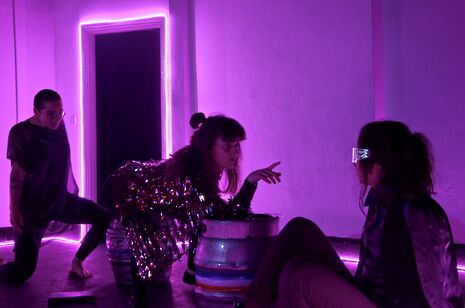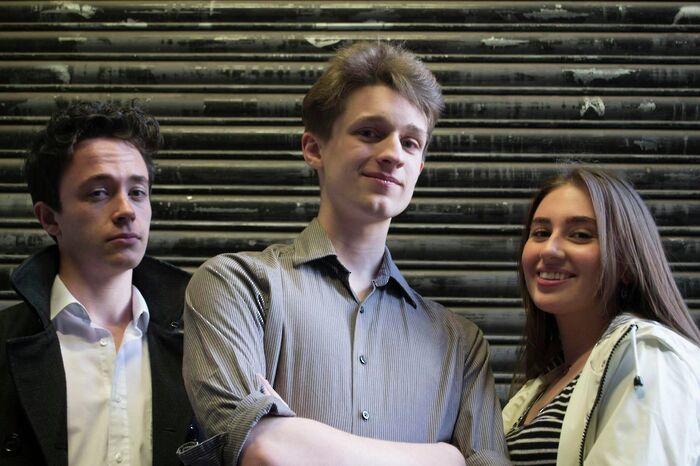Doctor Faustus review
Marlowe’s tragedy half-heartedly modernised

Modernisations of classics are a perpetually popular choice in student theatre, presumably in large part because they provide a way to put one’s own stamp on something well-known and in doing so make one’s own artistic decisions stand out vividly. They also allow artists to collaborate together across time and space and help to keep things fresh and relevant; indeed, in some ways, Doctor Faustus is rooted in the cultural and religious upheaval of its time.
Faustus’s descent from lofty wide-eyed ambition to petty trickery and finally to futile repentance was conveyed masterfully
The modern element introduced to this production (directed by Atlanta Hatch and produced by Katey Parker) was Virtual Reality, but its presence was disappointingly perfunctory. In fact, had I not read the preview, I would not have been entirely aware that Faustus (Lara Cosmetatos) was not learning necromancy but rather building a Virtual Reality headset. The addition of VR might have been more effective had it been accompanied by a more wholesale reimagination of Marlowe’s material, but if the script was to remain unaltered then there was admittedly little scope for this. While no doubt an intriguing element to introduce, it was hard to draw any interesting implications from it because it was not particularly prominent.
Aside from the unclarity regarding the VR headset, Cosmetatos’s performance as Doctor Faustus was extremely strong; Faustus’s moments of uncertainty were highly convincing, and his descent from lofty wide-eyed ambition to petty trickery and finally to futile repentance was conveyed masterfully. Opposite Cosmetatos, Anastasia Joyce gave a tremendously sinister performance as Mephistopheles, but was one-dimensionally sinister to the point of becoming grating after two or three scenes. Had the demonic writhing been toned down a little, Mephistopheles’s more dramatic moments of vicious seething anger would have been more startling.
Vee Tames’s Lucifer might also have been a more memorable character had it contrasted at all with Joyce’s Mephistopheles. The dancing of the chorus to techno music (Vee Tames, Pablo Cano Carciofa, Izzie Glover, Benjamin Gibson) fit well with the neon aesthetic, and they doubled well as the shoulder-angels and -devils providing Faustus with conflicting advice.
Introducing VR is an interesting idea, but not one that has been committed to fully
Lighting choices were effective, especially in a scene in which Alexander the Great (Benjamin Gibson) and his paramour Thaïs (Izzie Glover) were conjured up by Faustus to the delight of a wonderfully maniacal Emperor Charles V (Vee Tames), and also heightened the drama of Faustus’s repentance in the closing moments. Music was added to a number of scenes with some success, but was overused and somewhat repetitive, reducing its potentially high emotional impact.
Projecting fire and stars on the walls at relevant moments was generally effective, but the decision to project images of statues of Helen of Troy seemed like a hasty afterthought, particularly because Helen’s appearance in the play is of the same kind as the appearance of Alexander and Thaïs (as onstage mute spirits), but the latter pair appeared onstage whilst Helen did not.
This production is undoubtedly enjoyable but feels somewhat underdeveloped. Introducing VR is an interesting idea, but not one that has been committed to fully; the characters are well acted, but, Faustus aside, rather monotonic; maximal use is made of minimal musical means; and some set- and costume-design decisions seem to have been made in haste. Nevertheless, it sits favourably among productions with similar ambitions, and has numerous highly positive elements that make it worth seeing.
 Features / Beyond the porters’ lodge: is life better outside college?24 February 2026
Features / Beyond the porters’ lodge: is life better outside college?24 February 2026 News / Cambridge academics sign open letter criticising research funding changes22 February 2026
News / Cambridge academics sign open letter criticising research funding changes22 February 2026 Theatre / Footlights Spring Revue? Don’t Mind if I Do!25 February 2026
Theatre / Footlights Spring Revue? Don’t Mind if I Do!25 February 2026 News / Cambridge and Manchester Universities meet for innovation partnership26 February 2026
News / Cambridge and Manchester Universities meet for innovation partnership26 February 2026 Fashion / The evolution of the academic gown24 February 2026
Fashion / The evolution of the academic gown24 February 2026










![How to Create an Attractive Freelancer Portfolio [5 Tips & Examples]](https://www.varsity.co.uk/images/dyn/ecms/320/180/2026/02/vitaly-gariev-ho2tNOWZYXM-unsplash-scaled.jpg)